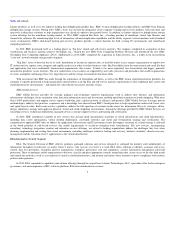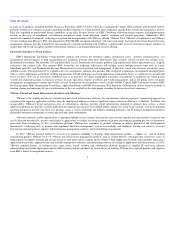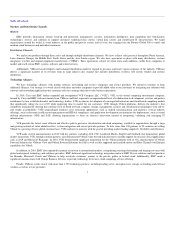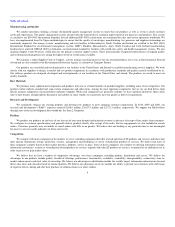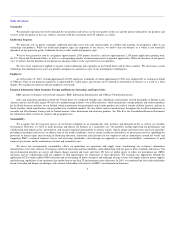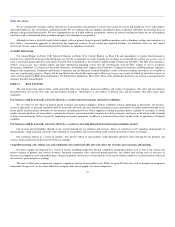EMC 2010 Annual Report Download - page 16
Download and view the complete annual report
Please find page 16 of the 2010 EMC annual report below. You can navigate through the pages in the report by either clicking on the pages listed below, or by using the keyword search tool below to find specific information within the annual report.
Table of Contents
• changes in a specific country's or region's economic conditions;
• political or social unrest, such as recent developments in Egypt, where we have a research and development facility;
• trade restrictions;
• import or export licensing requirements;
• the overlap of different tax structures or changes in international tax laws;
• changes in regulatory requirements;
• difficulties in staffing and managing international operations;
• stringent privacy policies in some foreign countries;
• compliance with a variety of foreign laws and regulations; and
• longer payment cycles in certain countries.
Foreign operations, particularly in those countries with developing economies, are also subject to risks of violations of laws prohibiting improper
payments and bribery, including the U.S. Foreign Corrupt Practices Act and similar regulations in foreign jurisdictions. Although we implement policies and
procedures designed to ensure compliance with these laws, our employees, contractors and agents may take actions in violation of our policies. Any such
violations, even if prohibited by our policies, could subject us to civil or criminal penalties or otherwise have an adverse effect on our business and reputation.
In addition, we hold a significant portion of our cash and investments in our international subsidiaries. Potential regulations could impact our ability to
transfer the cash and investments to the United States. Should we desire to repatriate cash, we may incur a significant tax obligation.
We operate a Venezuelan sales subsidiary in which the Bolivar is the functional currency. Due to limitations in accessing the dollar at the official
exchange rate, we have utilized the "System for Transactions in Foreign Currency Securities" or SITME rate, which is the available market rate in the country
to translate the foreign currency denominated balance sheet. Our operations in Venezuela include U.S. dollar-denominated assets and liabilities which we
remeasure to Bolivars. The remeasurement may result in transaction gains or losses. We have used either the official exchange rate or the parallel exchange
rate to remeasure these balances based upon the expected rate at which we believe the items will be settled. As a result of continued hyper-inflation in
Venezuela, effective in 2010, we have modified the functional currency to be the U.S. dollar. As a result of this change, Bolivar-denominated transactions will
be subject to exchange gains and losses that may impact our earnings. While we do not believe this change will have a material impact on our financial
position, results of operations or cash flows, these items could be adversely affected if there is a significant change in exchange rates.
Security breaches could expose us to liability and our reputation and business could suffer.
We retain sensitive data, including intellectual property, books of record and personally identifiable information, in our secure data centers and on our
networks. It is critical to our business strategy that our infrastructure remains secure and is perceived by customers and partners to be secure. Despite our
security measures, our infrastructure may be vulnerable to attacks by hackers or other disruptive problems. Any such security breach may compromise
information stored on our networks. Such an occurrence could negatively affect our reputation as a trusted provider of information infrastructure by adversely
affecting the market's perception of the security or reliability of our products or services.
Undetected problems in our products could directly impair our financial results.
If flaws in design, production, assembly or testing of our products (by us or our suppliers) were to occur, we could experience a rate of failure in our
products that would result in substantial repair, replacement or service costs and potential damage to our reputation. Continued improvement in manufacturing
capabilities, control of material and manufacturing quality and costs and product testing are critical factors in our future growth. There can be no assurance
that our efforts to monitor, develop, modify and implement appropriate test and manufacturing processes for our products will be sufficient to permit us to
avoid a rate of failure in our products that results in substantial delays in shipment, significant repair or replacement costs or potential damage to our
reputation, any of which could have a material adverse effect on our business, results of operations or financial condition.
Our business could be materially adversely affected as a result of the risks associated with alliances.
We have alliances with leading information technology companies and we plan to continue our strategy of developing key alliances in order to expand
our reach into markets. There can be no assurance that we will be successful in our ongoing strategic alliances or that we will be able to find further suitable
business relationships as we develop new products and strategies. Any failure to continue or expand such relationships could have a material adverse effect on
our business, results of operations or financial condition.
15


